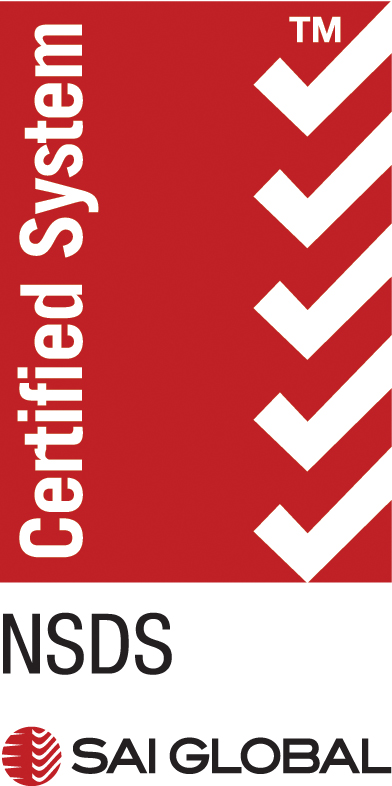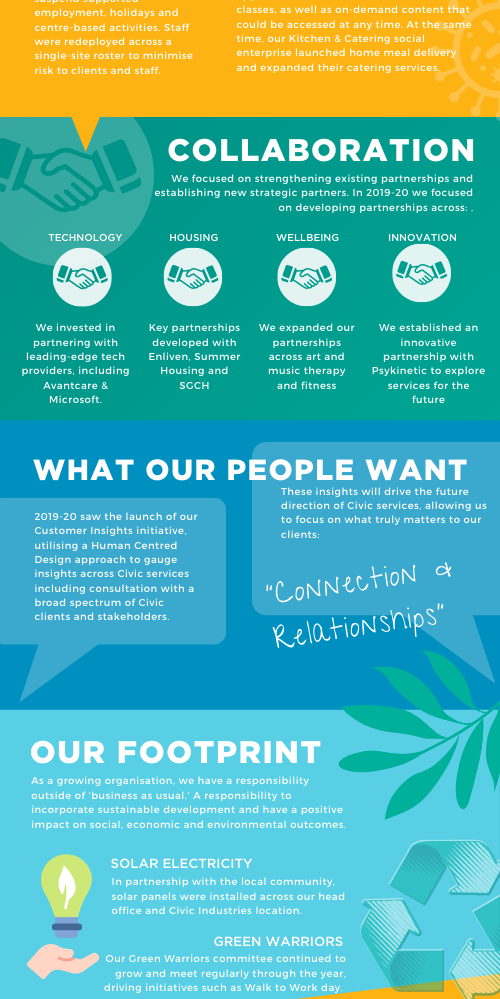
Dear All,
It has been a year like no other, during which, as an organisation and wider community, we have had to come together in order to navigate and continue to thrive in what we hope will be a once-in-a-lifetime event. We therefore start this Annual Review with a heartfelt thanks to our people:
- To our employees who have responded to multiple evacuations throughout the bush fires; who have created meaningful opportunities for connection and engagement amid the hardest of circumstances; and who have adapted to a fundamental shift in the way we delivered services during a COVID-19 pandemic.
- To our clients who have had to adjust to service interruptions, separation from their families and changes to their established routines, sometimes in isolation in their own homes.
- To our families and partners who have supported the decisions we have made during this time, and never questioned our commitment to the health and safety of their loved ones.
- And to our supporters, who have continued to champion the important work we do as we adapt in a changing environment.
It is against this backdrop that we have continued to thrive in our 62nd year.
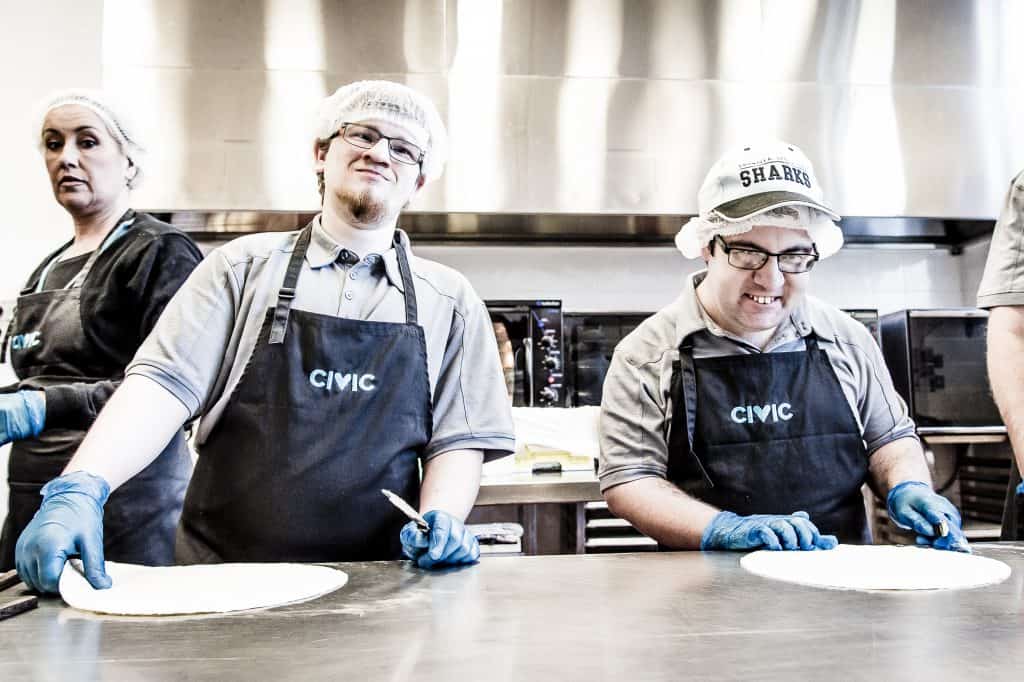
During the 2019-20 financial year we have achieved a total revenue growth of 16%, driven by increasing our reach in Supported Independent Living across West and South West Sydney, and through the expansion of our Kitchen & Catering social enterprise.
But it is the impact of this growth of which we are most proud – impact that we see daily in the lives of those we support.
Taking over the management of a café in Sydney’s South in late 2019 provided us with the opportunity to expand our impact in supported employment, providing valuable employment and vocational training to 10 individuals with disability. This was followed quickly by the opening of our coffee cart in Penrith, providing more opportunities in an emerging region.
In 2019-20 we welcomed 89 new clients to the Civic family, and opened five new homes across our service regions. We have also welcomed 187 new members of staff to our team, including a notable expansion in our clinical services team, with a team of Registered Nurses now instrumental in providing a quality service to our clients.

During the ongoing pandemic, it was those attending supported employment and centre-based activities who were affected the most during the initial lock down. Civic, like other organisations, acted quickly to suspend these services in order to prioritise the health and safety of our clients, staff and wider communities. We are grateful that this early action meant that we have remained free from a COVID-19 outbreak throughout the pandemic. This decision also necessitated the delivery of in-home services. We were therefore able to launch Civic@Home to our 500 plus clients in March this year, delivering live music, art and fitness classes, on-demand activities, as well as weekly social dance parties via Zoom. We look forward to expanding this service to remote regions in the future.
Accommodation services continue to represent 80% of Civic’s total revenue, and we have maintained our focus on working alongside partners to develop novel and contemporary accommodation services in the past financial year. Working with key partners such as Summer Housing, Enliven and SGCH, we have welcomed 40 new clients to our concierge support service, providing 24-7, unplanned supports to individuals with disability living in their own apartments. We also established a light-touch support model in Liverpool, providing accommodation to five individuals at risk of homelessness.
Looking to the year ahead, it is one we are excited for, but one that is characterised by uncertainty.
Over the past 12 months, the National Disability Insurance Agency (NDIA) has continued to introduce frequent changes, driven by the desire to improve visibility, choice and control for participants and to ensure the Scheme’s stability. While many of these changes are welcome, the continual refinements and improvements have presented challenges to organisations across the sector. We will continue to work in collaboration with the NDIA, and provide a voice for essential service providers who are crucial to the delivery of quality services to those with disability in Australia.
We also welcome the continuing work of the Disability Royal Commission in highlighting the treatment of disability within our communities. We know that this spotlight will ultimately drive improvements and equalities and will reduce the incidents of violence, abuse, neglect and exploitation.
Financial growth not only ensures the stability of our valued services, but also allows us to invest in innovation and to explore services of the future. We are committed to driving research and innovation in disability services across housing, community engagement and technology, and hold our vision of a future in which everyone’s potential can be realised close and true in all that we do. In an ever-changing landscape, holding onto this vision is perhaps more important than ever, while we work to balance innovation and sustainability.
As we work towards this future, we know you will continue to support us. We hope you enjoy reviewing some of our areas of focus, and some of the key stories that have emerged in the past 12 months.
Warm regards,
Dunstan de Souza, Annie Doyle
Dunstan De Souza, Chair of the Board and Annie Doyle, CEO
Please note, in line with our commitment to a sustainable future, our Annual Review 2020 is presented online. You can download a PDF version of our Annual Review 2020 by clicking here.
Financials
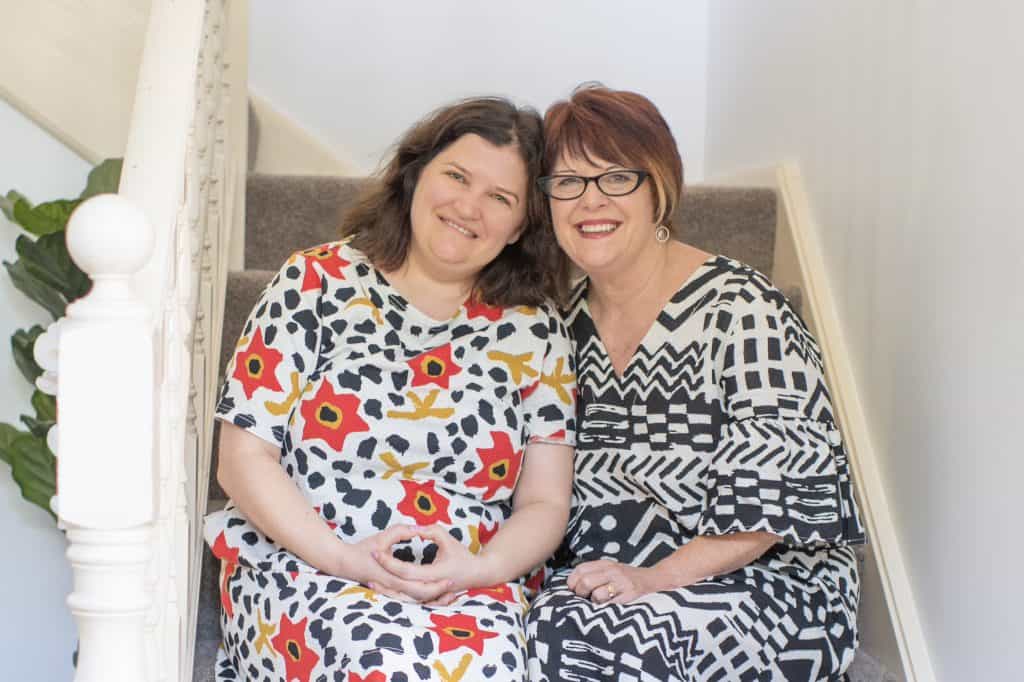
The 2020 year has been another successful one for Civic with continued growth and financial stability whilst working tirelessly to manage the significant disruptions of the bushfires over New Year and the Covid-19 pandemic in the second half of the financial year.
Growth has continued at Civic with 16% Revenue growth following three consecutive years of growth in excess of 20%. This has resulted in a more than doubling of Revenue in four years. This growth has been carefully planned and centred around the core accommodation business which now contributes over 70% of Civic’s Revenue.
The Balance Sheet continues to strengthen. In 2020 a further $2.5m of Operating Surplus has been added to Net Assets which now stand at $30.3m having increased, following the triennial property revaluation in 2018, more than $10m in the last three years.
The stability and careful management of the core business during a disruptive year has enabled innovation to continue both to proactively manage the pandemic (single-site rosters and pivoting the café business to deliver meals) and prepare for the future with continued investment in technology.
Our success as an organisation relies on the ongoing dedicated work of the entire Civic team together with the support of funding bodies, commercial customers and the tremendous backing we receive from the community. I wish to thank you all, our supporters, for contributing to these results.
Michael Coughtrey, Treasurer, and Mike Churchman, Chief Financial Officer
Welcome to our new Board Members
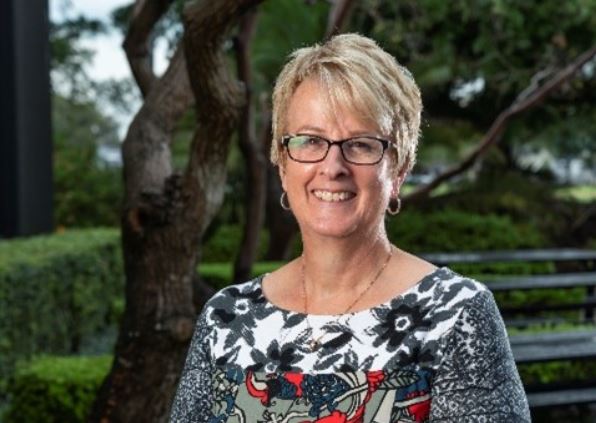
This year we welcomed two new members to our board, Liz Clowes and Chris Gabriel.
Liz Clowes, BA, LLB (Hons)
A former Member of Civic’s Board of Directors, we were delighted to welcome Liz as she returned to the Civic Board in 2020. As Director, Human Resources at Schindler, Liz brings with her a wealth of experience. Liz is a senior executive in human resources and industrial relations and has extensive experience in organisation change. Liz is an award winning Senior Human Resources professional with an extensive background in business transformation through culture change using inclusion, employee engagement and change management across the professional services, construction, service, IT and the manufacturing industries. Liz also takes on the role of Chair, Corporate Governance and Risk Committee, and is a member of our Quality Outcomes Committee.
Christopher Gabriel FCA
Chris is the senior partner in Gabriel & Partners, a firm of Chartered Accountants established in 1987 in the Sutherland Shire. Chris has experience in both large and small businesses as well as not-for-profit organisations and charities. He is a director of Payce Consolidated Pty Limited, a major property development company, as well a director of the Payce Foundation, a large private charitable foundation. He is a registered company auditor. Chris was a previously member of the Civic Board from 2005 to 2014 and was continuously a member of the Finance and Corporate Governance committees. Whilst continuing as a Civic Member post 2014, Chris served on the Corporate Governance & Risk Committee.
Our Response – COVID-19
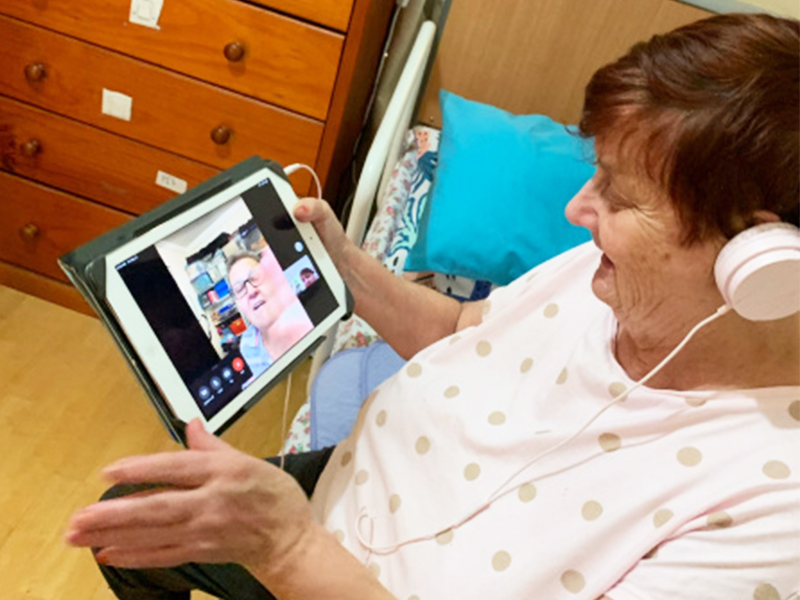
When COVID-19 first emerged in Australian newspapers in January, few of us had an understanding of the impact the virus would have on each of us, both personally and professionally, within just a few short weeks.
Fast forward to mid February and it became clear that early intervention would prevent widespread infection. “We decided at the end of February to immediately suspend our supported holidays service. This was followed within a few days with the decision to suspend supported employment and centre-based activities,” recalls Annie Doyle, CEO. “It was apparent that minimising interaction and community activities was critical to stopping the spread of coronavirus.”
However, the impact of these actions cannot be underestimated – not only for staff, but for clients with intellectual disabilities who often rely on routine and familiar activities. “Forcing clients into lock down, and enforcing separation from loved ones was felt by clients, families and staff across the organisation,” says Annie. “I am grateful that we were fully supported by our wonderful community throughout this time, and I truly believe this early action prevented an outbreak within our organisation.”
Civic also took the early decision to introduce ‘single-site rosters’, minimising the risk of further infection should a staff member test positive for coronavirus. Staff from our Hubs (which were temporarily closed) were re-deployed to support individuals in their homes, where activities were now focused
Suspension of services meant Civic needed to adopt a new way of supporting clients. “With many of our most vulnerable people reliant on supported day programs to connect with others, learn, and be active every day, continuing support was critical,” recalls Annie. ” We drew on existing partnerships and connections to develop and pilot a platform that could deliver programs similar to those previously delivered in the community, in the comfort of clients’ homes.”
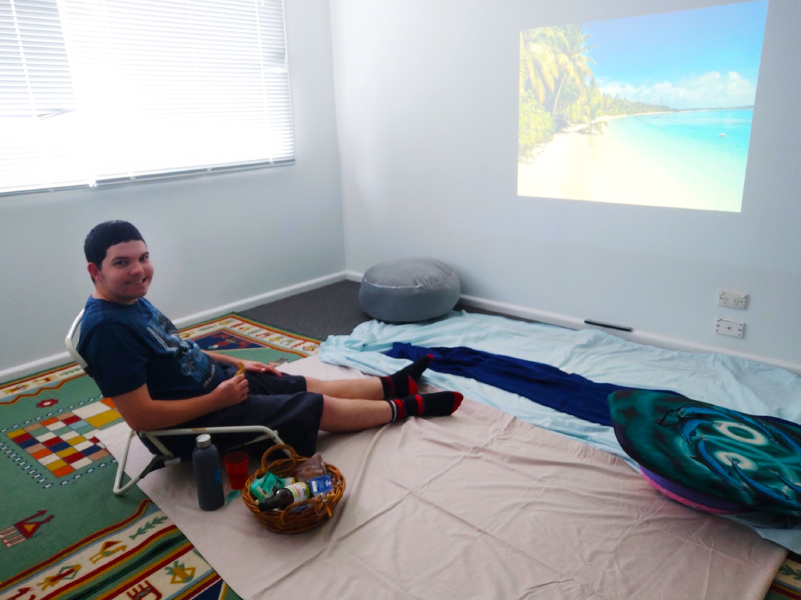
Rhys brought the beach to his front room during lock down.
The Civic @ Home platform was launched in March and continued to offer clients a timetable of live classes, including fitness sessions, art therapy classes, weekly Friday night discos, and music therapy classes, delivered via Zoom. At the same time, clients have access to on-demand content, including floristry lessons, fitness classes, gardening how-tos, and art lessons, all of which could be accessed by individuals and their support team at home. The platform has proven so popular, Civic is expanding the content and delivering to more clients each week, even as social restrictions are eased.
During the early days of the pandemic, Civic was also quick to act on a call-out from NSW Health to the disability sector requesting accommodation solutions that might facilitate the discharge of suitable patients. Rapidly deploying a dedicated team, Civic worked with a number of individuals to successfully transition them from hospital, into Medium Term Accommodation, and in some cases on to longer term accommodation, providing clinical assessments, support with funding applications and comprehensive transition plans to facilitate a streamlined and successful transition from hospital.
Our Investment in Technology
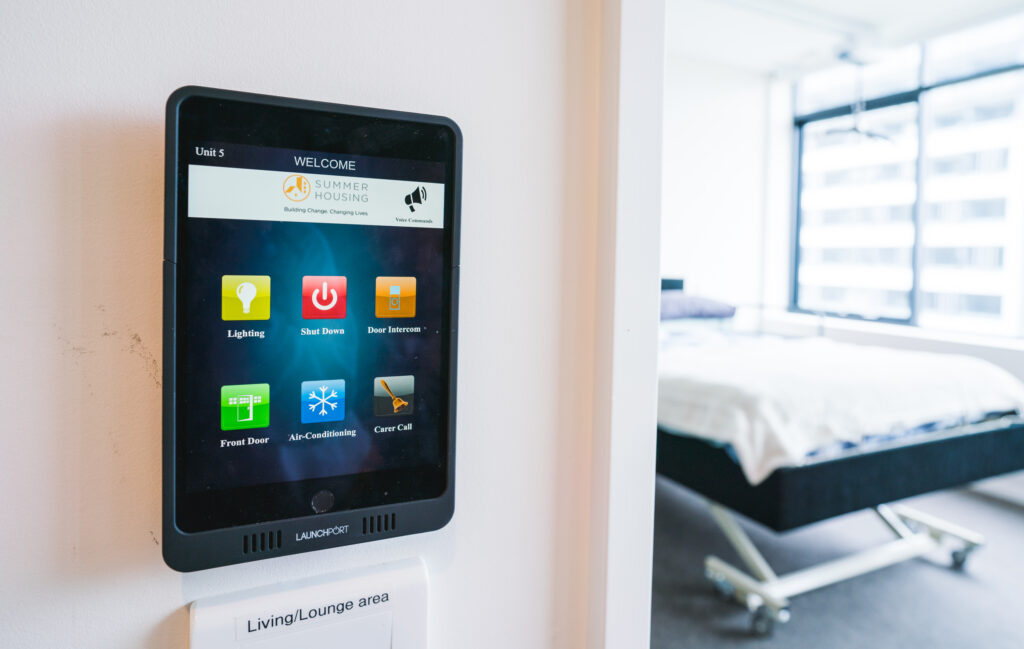
Systems and technology have taken centre-stage this year, as we partnered with Microsoft to implement a new client-management system, delivering a more streamlined experience for our clients and staff, and prioritised partnerships that draw on technology to support those with disability.
At Civic, our vision is Human Potential, Realised. And it is our mission to ensure as many people as possible live a life that is as remarkable as they are, with quality, trusted supports in place that afford them independence.
As an ambitious, forward-thinking organisation our goal is to improve outcomes for individuals with disability by investing in innovation, technologies and pilot ideas which drive forward the delivery of disability services.
Investment in Assistive Technology (AT), which builds independence, is a key priority for our organisation.
Over the past year we have partnered with housing providers to support tenants as they move into purpose-built SDA apartments in mainstream developments, where they can live independently, with the support of technology.
These apartments are equipped with a variety of AT modifications, including automatic sliding doors which operate on sensors throughout the home. This can make a huge difference to individuals who use a wheelchair or have limited mobility, making it easier for them to move around their home.
Residents can also use a cloud-based voice service platform to power a range of different devices, via voice control.
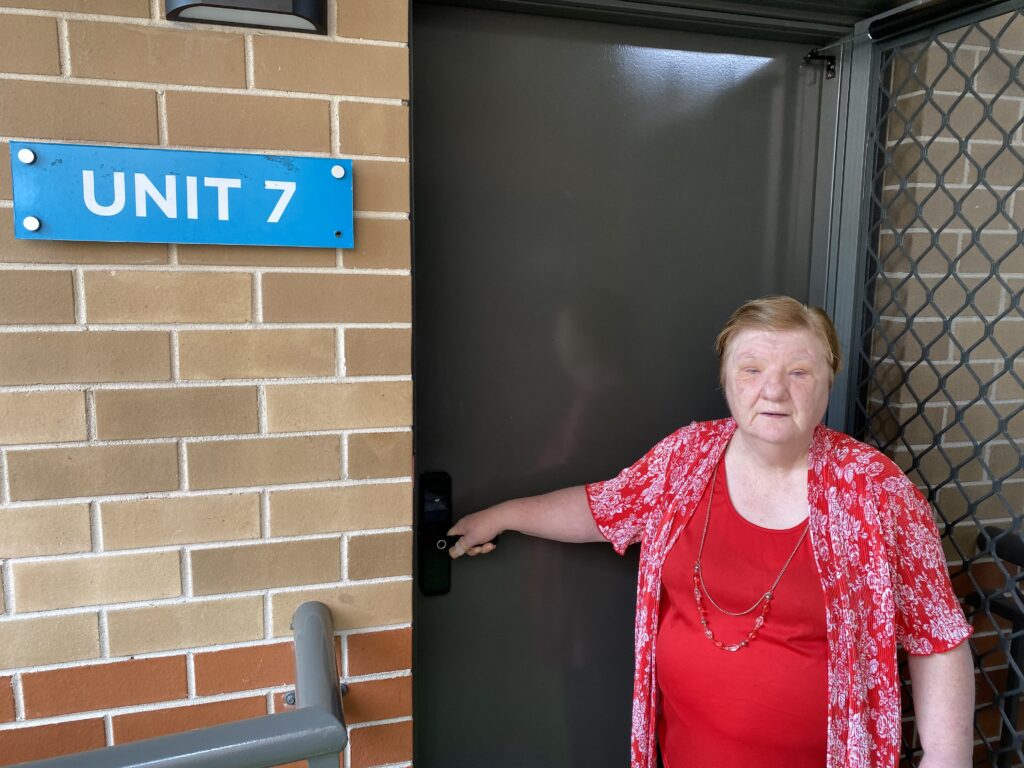
Anne uses a Smart Lock to access her home safely.
At Civic’s Aged Care accommodation, a centrally-controlled entry system allows individuals living and working on site to view, speak to and grant access to visitors from their mobile phone. For a support worker, this allows them to stay with a resident, instead of leaving them to open the door.
As a result of the global pandemic, it has become essential that we screen visitors at all of our sites. An automatic temperature screening camera has been installed at our aged care accommodation for the protection of some of our most vulnerable residents.
In the year ahead, thumbprint and code-activated doorknobs on individual apartments will be installed, to make it easier for older residents to access their homes. This can be particularly helpful for people with limited dexterity, and individuals with Dementia, reducing reliance on keys for access and security. The whole entry system can also be centrally controlled by support workers on site, to ensure the safety and wellbeing of residents.
Further investments include the addition of automatic ambient sensor lighting to bathrooms and walkways, to assist residents who need to access the bathroom at night time, together with bespoke, technology which is specific to different needs, such as sensors that detect the frequency of trips to the bathroom; Epilepsy mats, to monitor for seizures while a person is sleeping; fall detection cameras; and a voice-controlled, nurse-call system, all tailored to individual needs.
All technology is designed to be as unobtrusive as possible, allowing individuals the opportunity to live independently, enjoy important time alone, and reduce their reliance on support.
“It is truly wonderful to see the difference that Assistive Technology can make in an individual’s life, reducing reliance on others and returning greater independence,” says Chief Infrastructure Officer, Celsus Joseph. “It can increase security and improve community participation. It not only provides comfort for the individual using the technology, but also for family, friends and care givers.”
Finding Employment in an Inclusive and Supportive Environment
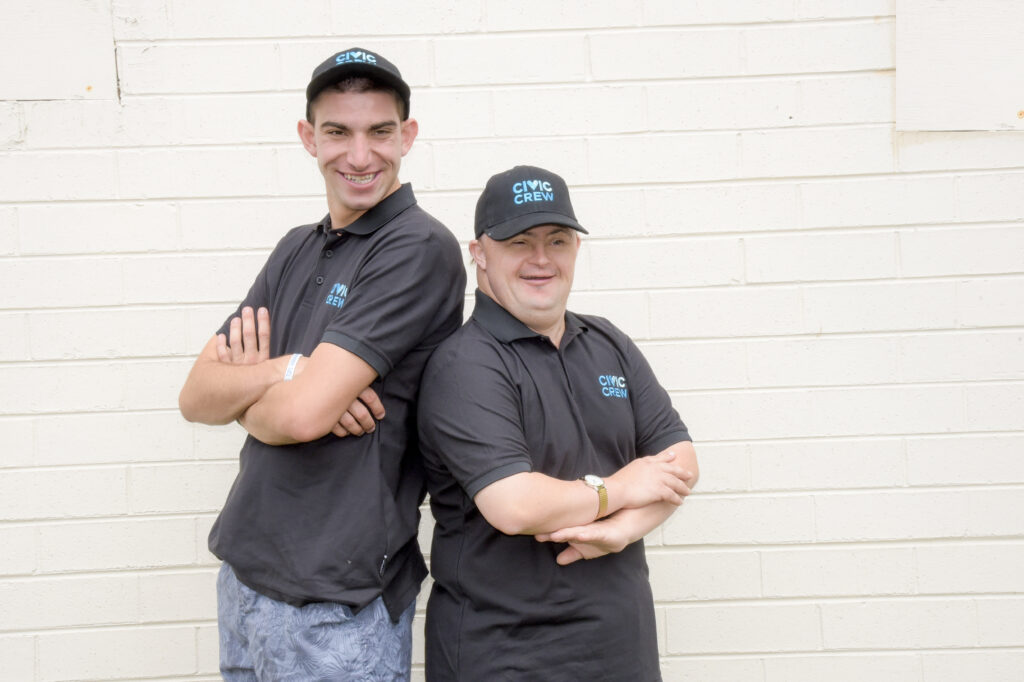
This year Civic worked to expand our impact in the employment sector, with a commitment to fulfil the need and wish of many people with disability to live meaningful, involved lives.
CIVIC CREW SUPPORT PARAMATTA’S REDEVELOPMENT
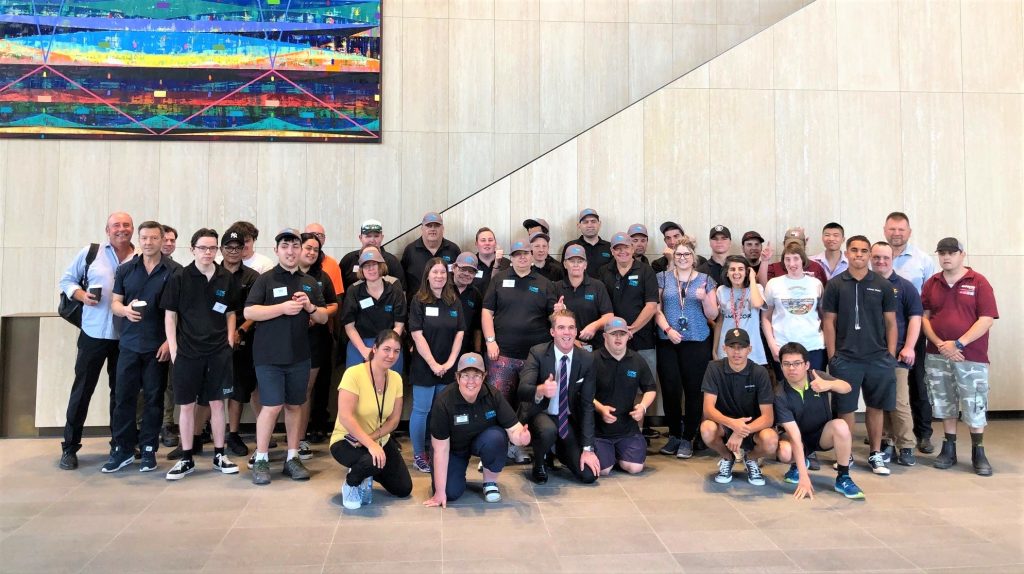
The recent redevelopment of 4 Parramatta Square is a prime example of how the NSW Department of Planning, Industry and Environment (DPIE) is working towards accessible workplaces for all.
Civic Disability Services, along with Achieve Australia and in partnership with National Disability Services (NDS) BuyAbility procurement service, this year completed installation work in Parramatta under its Civic Crew employment model, ensuring the premises are ready to go before opening.
Civic Crew is an award-winning social enterprise, helping businesses to employ individuals with disability on a short- or long-term basis. Aimed at breaking down any barriers to employment, Civic provides businesses with an on-site supervisor, a rotating team – or ‘ Crew’ – and full administrative and back-up support. Members of the Crew work both at Civic and on-site at the employer site, enjoying the social benefits provided by Civic as well as the advantages of employment in the community.
For this project, a team of 18 individuals were employed to assist with an office installation, installing first aid kits, stocking stationery and performing cleaning duties, among other duties at the site.
The NSW State Government partnership with NDS and Disability Enterprises was recognised by the NSW Premier’s Award for Public Service 2018, Job Creation Category.
As stated by Caroline Myers, Executive Director, Property, Fleet & Procurement, “the Department has a proud and successful history of engaging disability enterprises, not only are we supporting supported employees, we are delivering really good value for money for the NSW taxpayer.”
CIVIC CREW PROMOTE ACCESSIBILITY
Working outdoors and interacting with the local community, Civic Crew were employed by local construction firm, Degnan, to complete a mailing and distribution job in the Sutherland Shire.
Civic Crew members, Barbara, John, Mario, Brad, Chris, David, Josh, Samantha, Martin and Reagan, were thrilled to work on a local job offered by family-owned Degnan, which has been operating for more than 40 years. The 10 Crew members were tasked with delivering important information to residents about accessibility upgrades to Como train station.
As an award-winning social enterprise, Civic Crew is actively breaking down barriers, and offering companies a framework to successfully integrate people with disability into their workforce.
“The unemployment rate for individuals with disability is twice as high as the national average, but we know that so many of these individuals want to work,” Civic Crew Leader, Lucy said. “This latest job for Civic Crew presents a great opportunity for individuals with disability to engage with the community and perform a valued role in keeping people informed about changes to their local amenities.
“It has also helped them to build on their skills in organisation, navigation, traffic awareness and safety, all while being physically active and getting outdoors. Getting to take a lunchbreak on the water at Como Marina was also a huge plus point!”
A Parent’s Story: “Don’t wait until it’s too late”
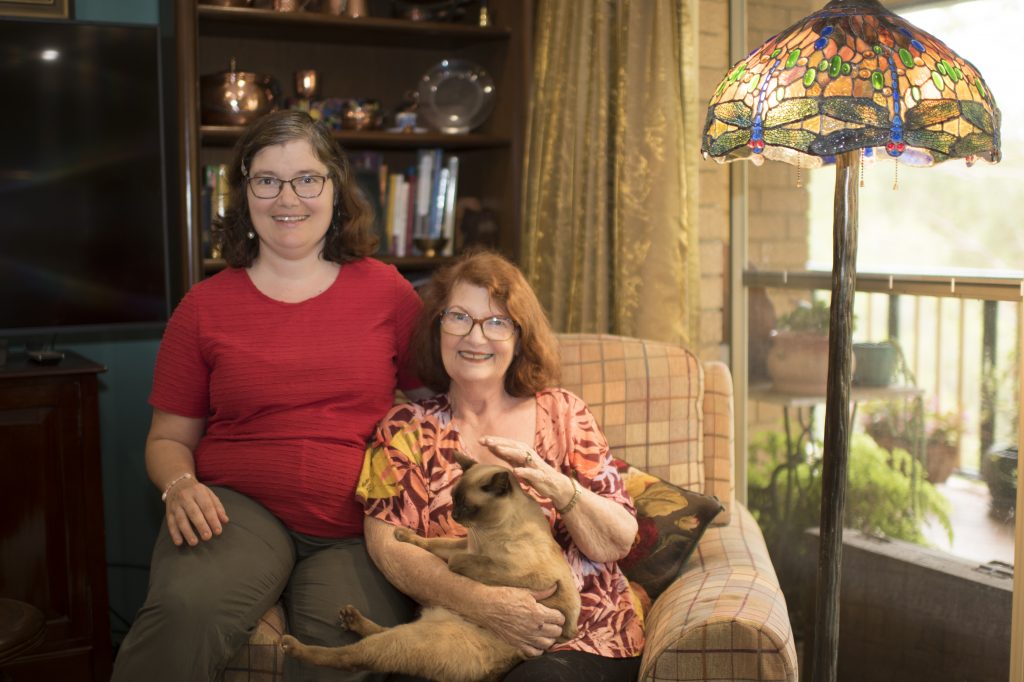
We often focus on the individuals we support. However, often, it is the families of those individuals who need our support just as much,
Two years ago, mum Robin became acutely aware of her own aging and frailty, having suffered some major health issues. She and her husband, Bob, began to worry about who would care for their daughter, Felicity, when they were no longer able to.
With recent studies highlighting the growing number of aging parents looking after adult children with disabilities, the couple were determined to give Felicity all the support she needed to increase her independence and reduce her reliance on them.
Sadly, Robin passed away in March this year.
Shortly before her passing, she and the family shared with us their experience of working towards a more independent life for Felicity. Showing incredible pragmatism and foresight during the most difficult of times, Robin had some very candid advice for other parents, that Bob would like to now share with others facing similar challenges.
“PLAN FOR THE FUTURE”
“It might sound morbid, but parents with adult children with a disability really need to consider their own mortality and plan for the future, anticipating that eventually they might not be able to offer the level of support they have always provided for their adult child,” said Robin earlier this year.
“For us, it was really important to introduce the idea early, before it became a necessity,” she continued. “This way, there is plenty of opportunity for Felicity to exercise choice and control in the situation. The journey towards independent living hasn’t been an easy transition for Felicity, but we’ve been able to work together to support each other through the ups and downs. Moving out of the family home is a huge step for anyone, I can’t imagine how difficult it would be for her, if she were also dealing with the loss of a parent.”
ANTICIPATING BUMPS IN THE ROAD
Felicity was 36 years old when she moved out of the family home and into a new house, which she shares with four other women who have since become close friends.
“It can be tempting to just ‘see what happens’, but planning is key,” said Robin. “As with any major life-change we’ve had some hiccups along the way, and that is to be expected. We’ve had the luxury of time to support Felicity through any bumps in the road, because we began this process early.”
WORKING IT ALL OUT
Finding the right type of accommodation and support can take some time and it’s important you find a provider that’s right for you and your child. Felicity’s dad, Bob, praised Civic’s collaborative approach with the family.
“There’s a lot of paperwork and assessments to be done to secure the funding [for SIL],” he said. “Civic has been great in helping us to work it all out. It’s a process. What was also good is that the girls all met together and socialised before they moved in to make sure everyone got along. Civic always ask lots of questions to make sure Felicity is feeling safe, happy and supported.”
As Felicity settled into her new home, it provided Bob and Robin with the opportunity to relax a little and for Robin to manage her own health.
“We know we are lucky because Supported Independent Accommodation is scarce where we live,” says Bob. “It’s great that Felicity has found somewhere where she can put down roots and enjoy her independence.”
Since moving out of home, Felicity has learned to do her own washing and is working towards being able to prepare meals for herself. “I really enjoy cooking!” she said. She also likes to go to the movies with her housemates and said: “We saw Dr Doolittle and had popcorn. It was fun. We sometimes do movie night at home too!”
As Felicity learned to become more independent, Robin recognised her daughter’s reliance on Mum and Dad in supporting her full and active social life. Felicity was used to her parents being there to drop her off whenever and wherever she wanted to go at a moment’s notice. “I like to go out to a lot of places,’ said Felicity. “Ragers, college, work, Special Olympics, Swimming, everywhere!”
Before publishing this story, Bob looked back on his late wife’s interview with us. In revisiting Robin’s words, Bob said, “It’s incredibly moving. Robin and Felicity were so very close, and although Robin never fully shared with us how unwell she was, she gave Felicity all the support she needed to build her independence and gain confidence to make a home away from her parents. It hasn’t been an easy road, and we both miss Robin terribly, but we are forever grateful to her for anticipating a future without her by our sides.”
Partnerships with Purpose
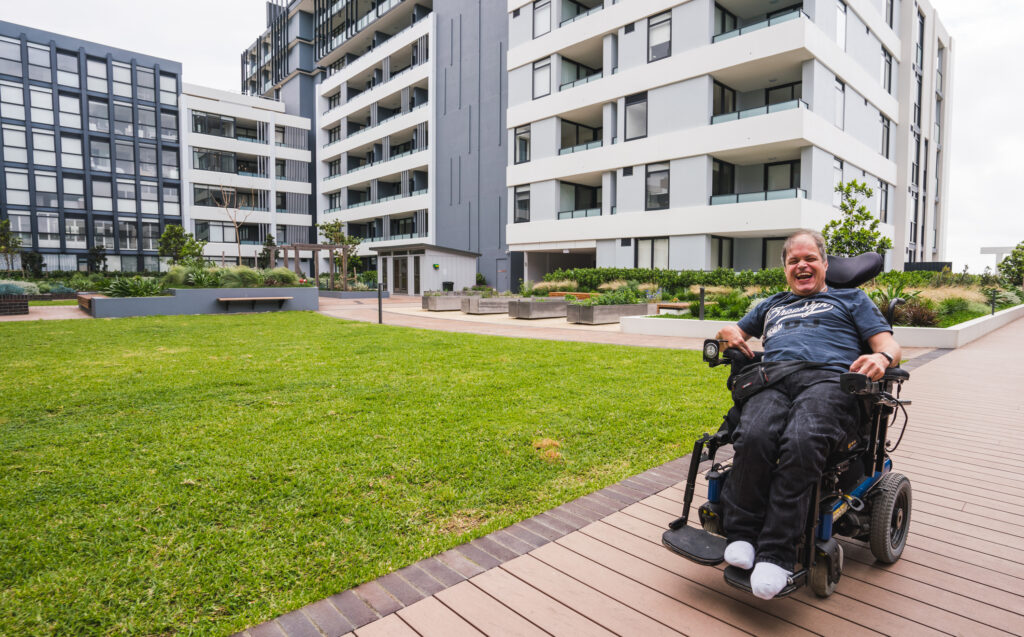
We seek out partnerships that allow us to do things we wouldn’t be able to on your own: to expand our skillsets, resources, offerings and, ultimately, our impact. At Civic, we believe in selecting partnerships that drive our purpose forward, and which allow us to achieve our overall vision.
This year we have continued to form strong partnerships across technology, wellbeing and accommodation, not least in our partnership with housing providers, including Summer Housing, SGCH and Enliven. Working along side these partners, we have facilitated the transition of upwards of 40 clients into their own apartments. One of those individuals is Jonathan, who this year moved into the brand-new Palais apartment building in Sans Souci, South Sydney.
The modern, high-quality Specialist Disability Accommodation (SDA) apartments are offered by Enliven Housing, with on-call, as-needed supports provided by Civic.
“This is all still so new to me. I am getting used to a new way of living,” said 51-year-old Jonathan who, until little over a year ago, was working long hours in a demanding role in construction. “One morning I had a fall in the shower and was left unconscious. The reason for the fall is still unexplained, but it left me with a significant spinal injury.”
“I was in hospital for eight months, working on my rehabilitation. I couldn’t go back to my old flat, because it wasn’t at all accessible for my wheelchair.”
Jonathan recalls looking at shared accommodation in the first instance, but knew after visiting that it wasn’t for him.
“I wanted my own space,” he says. “Then I was told about this new build where you share supports as a cooperative with other tenants but have your own private apartment. It sounded ideal, and when I saw it, I knew it was exactly what I wanted.”
There’s been a lot for Jonathan to take in over the last few months. “It’s a learning curve and it’s still all sinking in,” he says. “I am still learning how I want to live and how I can live, so being in a place that allows me to just be, is really important.”
Jonathan is now working on turning his new apartment into a home. He is focused on getting his supports in place, setting up his assistive tech and bringing in some personal touches. “There is a lot still to do, but I already feel comfortable and at home and that’s a great start.”
Katy, Practice Leader at Civic, has been working as part of the team supporting tenants with the transition to their new home at The Palais building.
“The paths which led the four individuals here are all very different,” she says. “There are individuals in their 30s, 40s and 50s. Some have high physical support needs; others have intellectual disability. They have either transitioned from hospital, unsuitable housing or aged care. And, while each individuals’ support needs are widely varied, the one thing they all have in common is a desire to live independently on their own terms.”
“This partnership with Enliven Housing provides individuals with SDA funding a real alternative to shared housing. It’s a unique housing model, whereby tenants live alone, but collaborate on decisions relating to their shared supports. There is equal opportunity for social and peer connection, and privacy and independence when required.”
Shining a light on Inclusion and Diversity
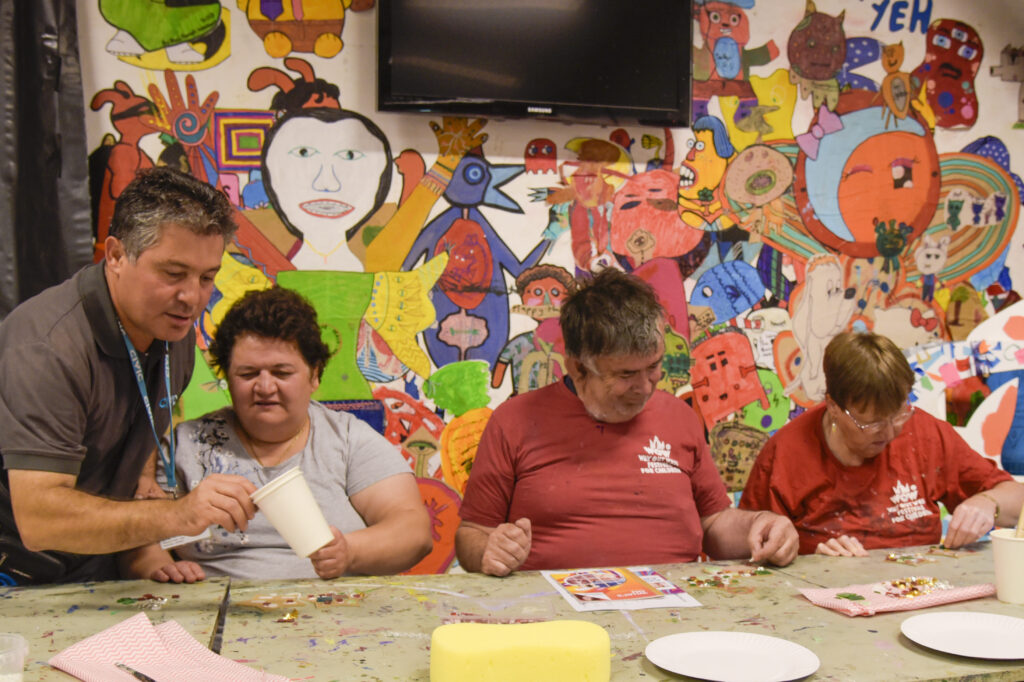
International Day of People with a Disability (IDPwD) proved the perfect opportunity for the Civic community to come together and shine a light on the achievements and contributions of those living with disability.
After months of planning and preparation, Civic held an inclusive Art Show at Casula Powerhouse Arts Centre, in partnership with Liverpool City Council. With clients and staff channeling their creative potential all year, their artwork was front and centre, as hundreds of members of the public came through the gallery to enjoy the one-off exhibition and purchase one-of-a-kind artworks.
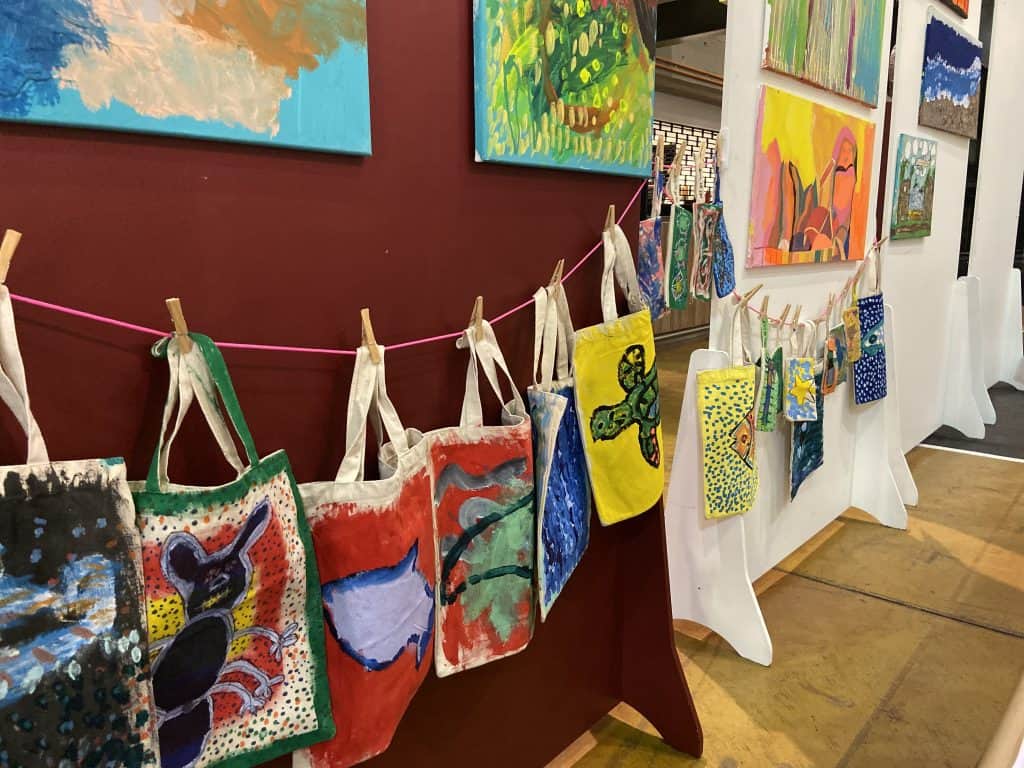
“Art therapy is a wonderful outlet for many, the process itself improving physical, mental and emotional wellbeing,” said Annie Doyle, CEO, as she opened the event. “Art has also been used as a way of dealing with conflict and change, providing the opportunity for some to express emotions.
“It’s incredible to see the hard work and dedication of everyone culminate in a fantastic event like this.”
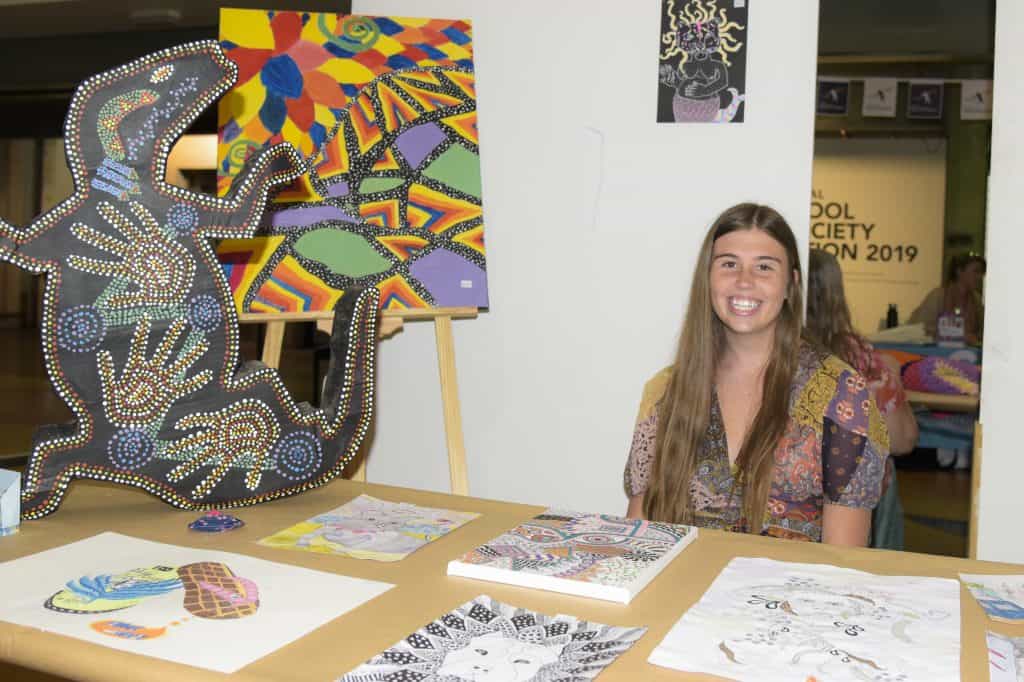
Local dignitaries and special guests attended the event which also included live music and garden tours, a mosaic workshop and a virtual reality art experience.
We’d like to thank everyone for their support in celebrating IDPwD and encourage everyone to strive every day to continue improving the lives of people with disability, their families and their carers.
Our People: The Vital role of Support Workers
At Civic, our people underpin the important work we do. Support Workers – who make up the majority of employees at Civic – play a pivotal role in the lives of individuals with disability. Their ability to build genuine, high-quality relationships is key in nurturing independence, wellbeing and social connection for those they support.
Sometimes referred to as ‘carers,’ the role of a Support Worker is often misunderstood. “What people might not know, is that some of the most effective Support Workers are master communicators and connectors. Their potential to facilitate other relationships, find common ground, or create it, is vital given that many people with cognitive disability experience loneliness and social isolation at higher rates than their non-disabled peers,” says Bronwyn, Operations Manager at Civic.
When asked what makes a good support worker, Bronwyn says that having a genuine interest in others is key. “It’s really difficult to pin down any specific personality traits or characteristics, because everyone’s needs are different. I have often had people say to me, ‘Oh, I wouldn’t be good in the role of support worker, because I am not nurturing, or caring enough,’ and that’s realty not what it’s about.
“In my time at Civic, I have seen so many heart-warming stories, where, through their Support Worker, individuals with disability have found new hobbies or interests, or someone to share an existing passion with.
“That really comes from taking the time to get to know the individuals you are spending time with, listening – really listening, remembering things, noticing and supporting achievements. Asking, rather than making assumptions. And, finally being able to step back and allow a person to do things for themselves and be independent. That’s what makes some feel valued and respected.”
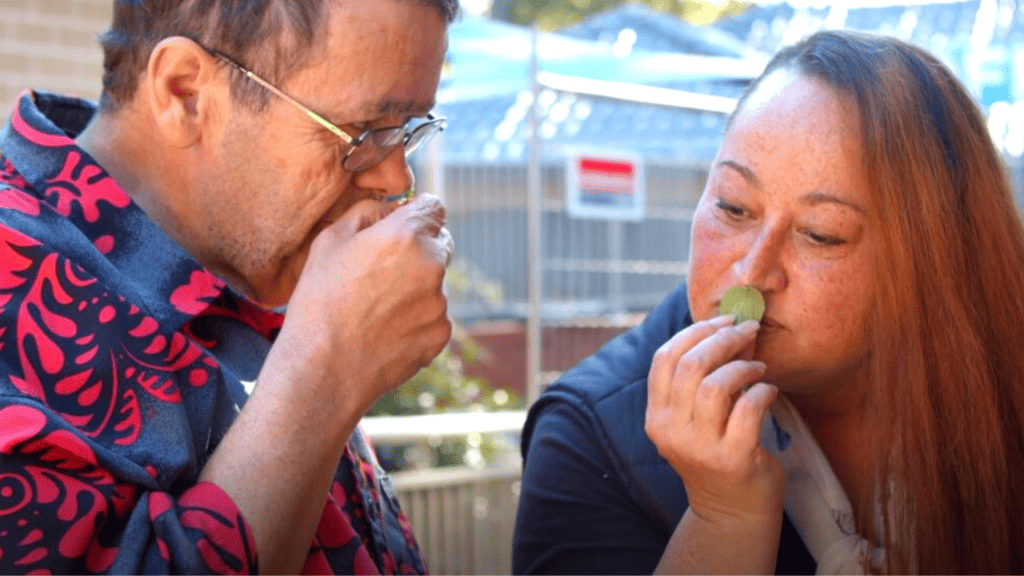
Civic support worker, Jaimee, is in her early twenties and works with Michael, who is in his sixties. The pair have built an unlikely friendship, based on common hobbies and interests including reading and yoga.
“Michael and I genuinely enjoy each other’s company and spending time together, and I think that’s really important. People might not expect that we would get along so well, but I try to keep open mind, and be ready to ask questions,” said Jaimee who has been a support worker at Civic for just over three years.
“Over time, we’ve built a mutual respect, and that comes from not making assumptions that we won’t appreciate or understand certain music, books or other hobbies.
“We both now know that the best way to support Michael achieve his goals, is when we come at things on an equal footing and work as a team together. It’s been wonderful to see how Michael’s confidence, self-esteem and self-respect has flourished in the time I have known him.”
Support Worker, Roy, worked for many years as a long-distance truck driver, before joining Civic. He readily admits that, at the time, it really was just another job to him, an income. But, as a people person, who loves, as he says, ‘a good old yarn’, he built strong relationships with the individuals he works with. Client, Sharon describes him as, ‘like a brother to me!’
Community Support: Expanding our Services
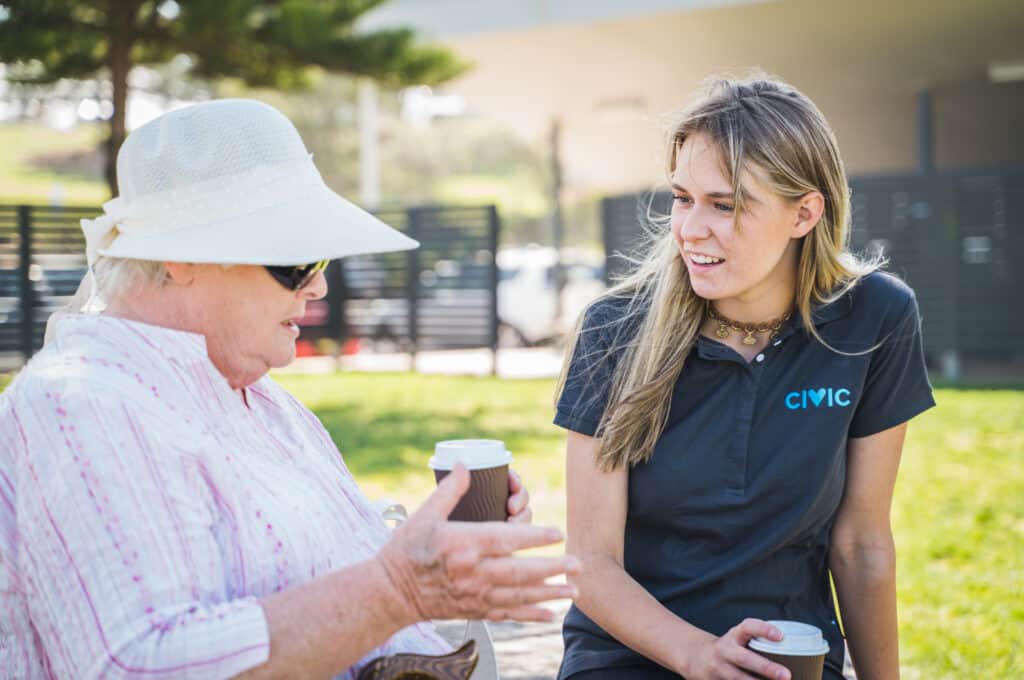
In the past 12 months we have expanded our services to include Flexible Aged Care, providing support to older Australians, of all abilities, who may require light-touch assistance with day-to-day tasks to restore or maintain their independence, particularly in the wake of Coronavirus.
As-needed, in-home support, such as accompanied, and unaccompanied grocery shopping, social outings and home visits, together with delivery of pre-prepared meals, from Civic Kitchen & Catering, are designed to support older people living alone, who may, in light of the current pandemic, be feeling isolated or anxious about everyday activities. In addition, Flexible Aged Care can also provide respite for family members and friends who act as carers. The services are available in the Sutherland Shire and are subsidised through the Commonwealth Home Supports Program, which means they are provided for free or at very low cost for participants.
“The current health crisis means that otherwise healthy, older Australians, who are physically active and used to doing things, like grocery shopping, for themselves, may not feel confident doing so at this time. This is especially true if it means using public transport or visiting places where they are likely to encounter large groups of people. Civic’s Flexible Aged Care offering provides a solution to this with its friendly and capable support team,” says Rita Chami, Operations Manager at Civic.
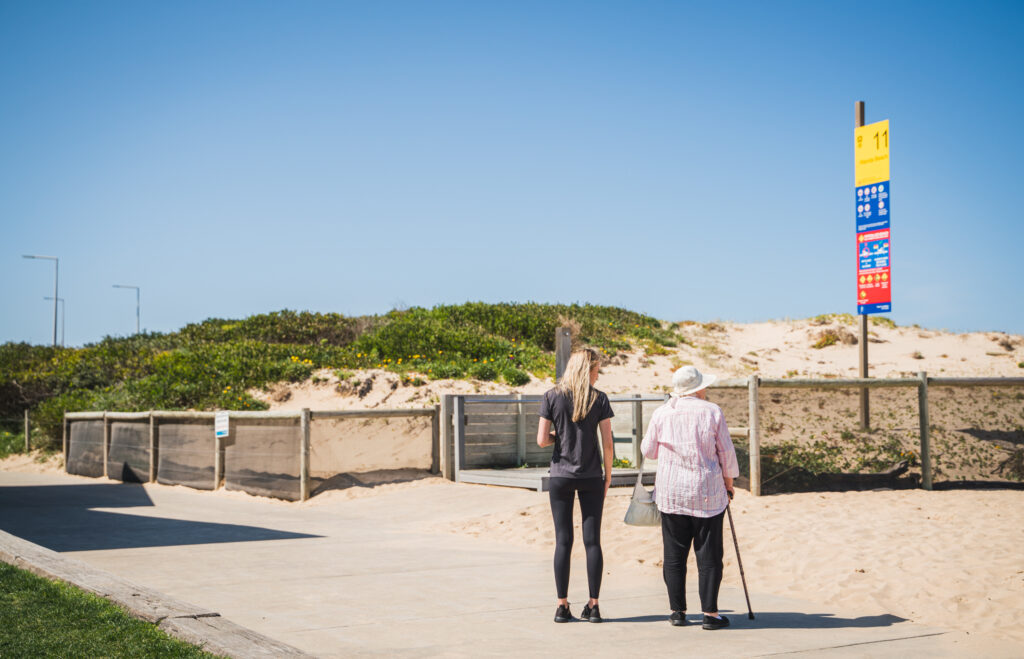
” In addition, the service also provides much-needed respite for some of the twenty thousand adults in the Sutherland Shire who provide support to elderly relatives and friends. At a time when COVID-19 has disrupted traditional overnight and short-stay aged care respite, Flexible Aged Care provides a real alternative by lightening the load for unpaid carers in these unprecedented times.”
Accreditations and Memberships
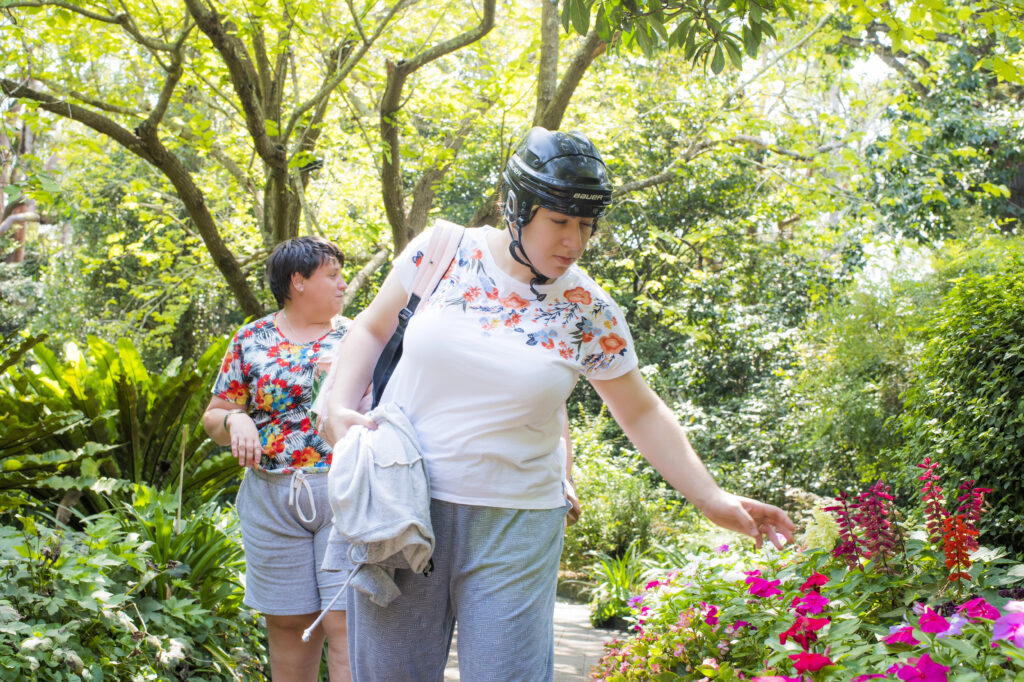
As a Registered Charity, we follow best practice guidelines and abide by the requirements of the Charitable Fundraising Act 1991 and Lotteries and Art Unions Act 1901. Our independently audited accounts also ensure our accountability to our donors and the community.
Civic’s policies and procedures reflect our commitment to creating quality services that are valued by clients and provide an environment where the health, safety and welfare of clients and staff is paramount. They also reflect Civic’s Vision, Mission and Values.
Civic’s Board, Management and Staff are committed to quality through sound governance and management across all aspects of our organisation.
External and internal audits are integral components of our quality management system, which is accredited to international standard ISO 9001:2015.
We make effective use of standards and related compliance activities to inform good practice and improvements in services.
Civic is a registered NDIS provider, and has met the NDIS Practice Standards, Quality Indicators.
Civic complies with the Aged Care Quality Standards and with the Attendant Care Standards. We are also a registered provider for the Voluntary Out-of-Home Care for Children and Young People and a Registered Community Housing Provider.
Civic Industries is an Australian Disability Enterprise as well as Social Traders certified
Finally, we would like to extend our sincere thanks to those who have continued to support and guide us through the past year.
We acknowledge all the individuals, organisations, trusts, corporates and foundations who have shown their faith in our vision and mission.
We also thank and acknowledge each of our members of staff whose work has such an impact on the lives of people living with disability, and the members of our Board, who generously commit their time and expertise to the stewardship of our organisation.

Civic Disability Services


